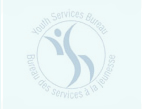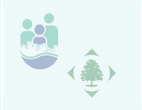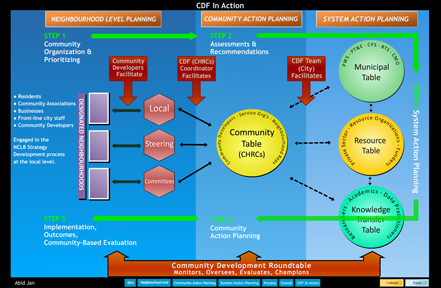









Keeping people safe & well
|
NCLB Coordinators' Guide
Roles and Responsibilities
For the new NCLB Coordinator, a commonly raised concern pertains to understanding the role and responsibilities attached to the position.
The questions that come to mind are:
- Does the NCLB Coordinator report to the Steering Committee?
- What is the NCLB Coordinator responsible for on a daily basis?
- Should the NCLB Coordinator be involved in running programs in the community? How much time does it take?
- How would the NCLB coordinators know if they are doing what is expected of them?
- What are the skills necessary to do the job of the NCLB Coordinator?
- How do you stay focused on ensuring accountability and sustainability as it relates to the activities at the respective NCLB site?
This first section will provide an overview of the role of the NCLB Coordinator in leading the implementation of the NCLB Strategy. The coordinators will learn what skills and attributes are required of the coordinator, what a NCLB coordinator is expected to do on a daily basis and the relationship between the NCLB Coordinator and the Steering Committee as well as the employer – the Community Health and Resource Centre (CHRC).
Section Objectives
- To learn what qualities are vital for success as a NCLB coordinator;
- To define the role and function of the NCLB Coordinator;
- To locate and understand site structure and key documents;
- To learn what you can do to strengthen your skills and abilities.
What qualities are vital for success as the NCLB Coordinator?
The function of the NCLB Coordinator is critical to the success of a good NCLB strategy. While the range of skills, language and experiences of NCLB coordinators may vary from site to site, there are some common qualities that all NCLB coordinators should possess.Undoubtedly, the coordinators possess many, if not all of these qualities. Let’s take some time to review these qualities.
Personal Attributes
− Possessing leadership and team building skills;
− Being adaptable and flexible;
- Working independently and as a team member;
− Being creative, innovative, and assertive;
− Having tact and patience;
− Demonstrating cultural sensitivity.Communication Skills
− Presentational skills;
− Arbitration and mediation skills;
− Facilitation and coordination skills;
− Negotiation skills.Organizational Skills
− Meetings (Steering Committee, subcommittees);
- Conducting;
- Organizing;
- Recording minutes;
- Following-Up.
Records Management
- Correspondence;
- Financial management including grant award documents
and basic budget skills;
- Meeting minutes and attendance -Program activities.Information Management
-Computer skills;
-Internet skills;
-Technical Assistance ( to whom and when to ask for help).Time Management
-Prioritizing work assignments;
-Realizing external timelines;
-Setting and meeting deadlines.External Partners and Internal Events Management
- Awards recognition;
- Partner relationships.Resource Development and Program Sustainability Skills
- Ability to think outside the box;
- Ability to develop long-range planning;
- Ability to identify and leverage partners and resources;
- Ability to build capacity;
- Ability to monitor and evaluate.While the NCLB Coordinator may possess many of these qualities at the start of their employment, they will certainly be more proficient in some areas and less so in others. Eventually, they will develop and improve all their skills and qualities. Coordinators will be able to accomplish this improvement through on the job experience, capacity building events, meetings and knowledge-sharing sessions with other NCLB coordinators and the NCLB online resource-database.
What should I know about the site structure and key documents based on the principles of NCLB?
The City of Ottawa’s Community Development Framework (CDF) uses NCLB for community engagement and putting a strategy development process in place in designated neighbourhoods. All NCLB coordinators are provided with the detailed information about the structure and operations of the CDF.
Briefly, the CDF structure includes the following multiple components working together to meet the CDF goals:
- A Community Table (shared experience);
- A Community Development Roundtable/Leadership (shared leadership);
- A Knowledge Transfer Table (shared knowledge);
- A Resource Table (collaborative processes);
- A Municipal Services Table (coordinated services).
The NCLB strategy is used for community engagement in the designated neighbourhoods. Each CHRC functions as an NCLB site, covering the neighbourhoods in its program area. Each CHRC establishes a Steering Committee Table and coordinates the NCLB program in its catchment. A coordination component links the grassroots and Steering Committee work with the five system level components mentioned above. The CDF Coordinator is a link between the communities and the Steering Committee in their program area.
Here is a simple structure and some important tips and tools to help the coordinators better understand how the NCLB program is structured and operates, originating at the grassroots level and connecting the respective site to the City-level operations, support system and other developments.
Click to view | Click to enlargeKey Documents To Be Reviewed
• NCLB Strategy Document;
• Community Development Framework outline;
• University of Ottawa Neighbourhood profiles.Strategy going forward. Although the Steering Committee may have been in existence before the coordinators arrived, it is important that the coordinators help provide clarification to new Steering Committee members and other community stakeholders. Keeping the relationships and responsibilities clear to all partners in the community will help ensure successful implementation of the strategy.
Given the range of skills and qualities of a site coordinator, the NCLB approach allows each NCLB site (CHRC) the flexibility of developing a job description for the NCLB Coordinator.
Sample job descriptions are available for your review from South East Ottawa Community Health Centre (SEOCHC). These descriptions do not provide specific details regarding education requirements or years of experience since needs and resources may vary significantly from site to site. Generic job description information is addressed in the following section.
Job Description
Activities
- Functions as primary outreach person for putting the NCLB strategy development process in place in the designated neighbourhoods;
- Reaches out to new partners and community residents in the designated neighbourhoods;
- Prepares and submits progress reports;
- Interfaces with Steering Committee;
- Serves as staff to the Steering Committee;
- Monitors the activities and progress;
- Works with all available partners to explore potential funding opportunities to support implementation of the community action plans in the designated neighbourhoods;
- Interfaces with the City of Ottawa and community service agencies;
- Seeks continuously to leverage a variety of resources;
- Leads the strategy development process;
- Collects and analyzes data that supports the strategy.
The preceding discussion covered How do NCLB Coordinators develop information about the various qualities and skills and strengthen them to be an effective coordinator.
Abilities and skills? Other things, which have not been discussed, can be done to develop and strengthen the kills of the NCLB coordinators.
Some of these activities will occur as the coordinators carry out their work on a daily basis, commonly referred to as on-the-job training. Others activities require a specific commitment of their time and effort. The following list contains examples of professional development recommendations that have proven helpful to other NCLB coordinators across the City.
Developing Core Operational Skills
- Peer mentoring from experienced NCLB sites;
- Technical Assistance from the Knowledge Sharing Table and CDF Coordinator;
- Support from CDF Coordination team;
- Annual Personnel Progress Reports.
Summary:
A new site coordinator may benefit from numerous opportunities to utilize existing skills while developing new ones. The key to being a successful NCLB coordinator is not only understanding the skills required for the job, but knowing what the specific functions of the position are, as well as the overall picture for the NCLB.A number of publications, manuals and other resource material have been developed to help NCLB coordinators complete many of the required tasks. The coordinators need to review these documents carefully, educate Steering Committee members if necessary, and seek out assistance if they have questions.











©
2005-15 South - East Ottawa Community Health Centre
Centre de Sante Communautaire du Sud Est D'Ottawa
Contact: Abid Jan Tel./ Tél: (613) 737-5115 Ext. 2403 Fax/Télé: (613) 739-8199
NCLB matters because neighbourhoods matter


